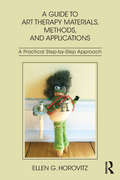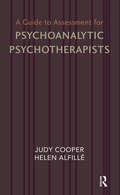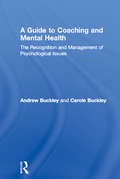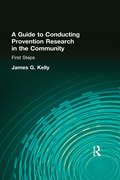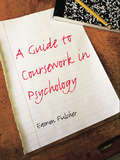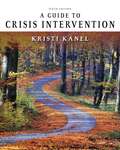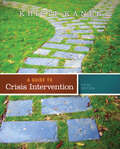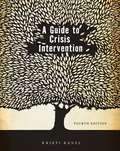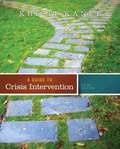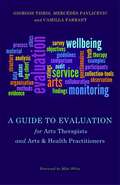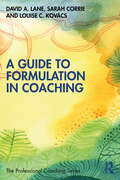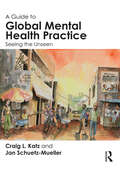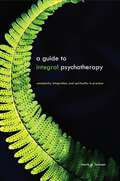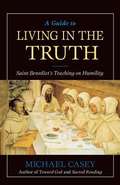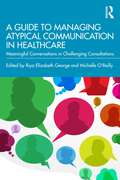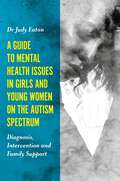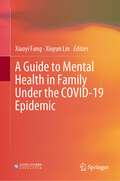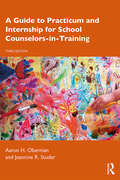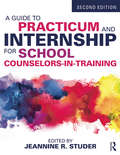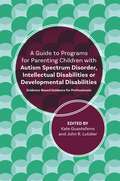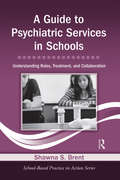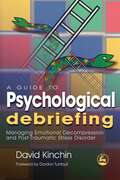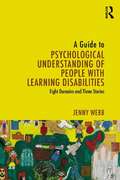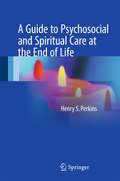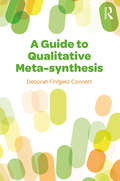- Table View
- List View
A Guide to Art Therapy Materials, Methods, and Applications: A Practical Step-by-Step Approach
by Ellen G. HorovitzWritten by a well-respected author and practitioner in the field of art therapy, A Guide to Art Therapy Materials, Methods, and Applications is an innovative, comprehensive text that guides readers in how to use basic to advanced art materials and methods in a wide range of clinical settings. Through the lens of both developmental stages and assessment, the book offers practical, step-by-step instructions to incorporate these materials and methods into therapeutic work with clients of all ages and populations. In addition to such classic tools as drawing, paints, pastels, and clay, coverage of materials and special topics extends beyond the existing literature to include glass, knitting, quilting, wood burning, felting, digital applications, phototherapy, byproducts, and more. Unlike previous guides, this book specifies population benefits and contraindications for each material and technique. This research-based guide for using art materials in a safe and effective manner will be a welcome resource for students, seasoned art therapists, and mental health counselors.
A Guide to Assessment for Psychoanalytic Psychotherapists
by Judy Cooper Helen AlfillePsychoanalytic psychotherapists and psychoanalysts inevitably find themselves doing assessment in their work, both in private practice and in a clinical setting such as the NHS. The authors felt a need for a book that covers this vital aspect of their work, which would be of benefit both to students in training and to practitioners. Amongst subjects covered are the nature of assessments, the setting, consultation, contraindications, and clinical examples. This title contains the distilled wisdom of over twenty years experience in the field.
A Guide to Coaching and Mental Health: The Recognition and Management of Psychological Issues (Essential Coaching Skills And Knowledge Ser.)
by Andrew Buckley Carole BuckleyIt is vital that coaches have the ability to recognise mental health problems in their clients, enabling them to make an informed decision about whether coaching is appropriate. A Guide to Coaching and Mental Health provides an indispensable introduction to the assessment of psychological issues in the context of coaching. Divided into three sections, the book covers all the legal, ethical and practical considerations. Section one, Working on the Boundary, starts by exploring the distinction between normal and abnormal behaviour. In section two, What’s Being Said, the authors introduce fictional case studies, which cover a range of possible mental health issues from mild depression and anxiety, through to psychoses and potentially life threatening problems. Section three, Categories of Mental Illness, guides the reader through the definition and management of the more common mental health problems. This accessible and jargon-free guide to identifying mental illness will prove invaluable for coaches and other related professionals, whatever their level of experience.
A Guide to Conducting Prevention Research in the Community: First Steps
by James G KellyThis provocative and useful volume is a step-by-step guide to assist professionals in implementing valid and useful community research and creating preventive interventions that have positive and lasting effects on the development of the community. The authors--including James G. Kelly, one of the fathers of prevention--offer valuable suggestions for developing community processes to assist the prevention researcher and the community in designing research that is embedded in the community. Experts focus on the topics that can help establish and sustain effective long-term working relationships with community members. Numerous examples illustrate how the collaborative working relationship can create the variety of resources that are needed to eventually implement policy changes stimulated by the research and help to sustain the impact of the research findings after the research has been completed.This exciting book illustrates how community research related to the prevention of mental illness and the promotion of mental health can be scientific and objective, as well as a positive collaboration between the research staff and community members. Focus upon community needs Emphasize educational activities to support the prevention research Identify points of policy impact before the research begins Enhance the development of social networks and social support systems for the development of competencies Provide criteria for the selection of systemic variables for the research Include reference to the multiple levels of a community which may affect the research topic Specify ways in which participants can identify and own the research topic Outline criteria for assessing the side effects of the prevention research In order to better understand the needs, values, commitments, and resources of the community in which he or she is working, the researcher is encouraged to select research topics derived from underlying community needs, educated the public about prevention, identify points of policy impact, and determine the informal social networks that enhance the development of social competencies in the community. The benefits of the collaborative relationship between prevention researchers and the community are strongly emphasized. A Guide to Conducting Prevention Research in the Community aims to guide citizens and professionals in implementing valid and useful community research and create preventive interventions that have positive and lasting effects on the development of the community.
A Guide to Coursework in Psychology
by Eamon FulcherEver had difficulty choosing a research project? Ever wondered how your work will be marked? This book will help students to understand the coursework specifications and marking criteria for a number of key exam boards, including; AQA (specification A and B), OCR, EDEXCEL and SQA. It provides specific and highly relevant advice on how to maximise achievement in coursework. Guidance is offered on how best to choose a research project, through to practical advice on how to carry out research and write up reports. Topics to be avoided are also considered and advice on how to navigate the difficulties and avoid common pitfalls provided. Key issues covered include: * An overview of the main methods of investigation in psychology * Data analysis, including how to present data in Word and Excel and how best to comment on it * How to draw conclusions from data and create inferential statistics. Incorporating a series of examples, including an investigation from start to finish, and a laboratory experiment, this book provides clear, hands-on advice. It will be an invaluable tool for GCSE, AS and A2 students, helping them to maintain their motivation through coursework assignments and to achieve their potential.
A Guide to Crisis Intervention
by Kristi KanelThis book is written for college students and beginning mental health professionals who might benefit from a step-by-step practical guide on how to work effectively with clients in a variety of settings. There are many case examples and practice opportunities woven throughout the text. This text works great in courses in which students are given opportunities to practice what they are reading through role-plays with one another, or with actual clients, under the supervision of the instructor or other mental health counselors and also useful for professionals such as police, firefighters, military personnel, as well as mental health counselors.
A Guide to Crisis Intervention
by Kristi KanelThis fifth edition of Dr. Kristi Kanel's A GUIDE TO CRISIS INTERVENTION covers the fundamentals of situational and developmental crises, how they occur, and how they have been managed since the 1940s. Kanel discusses traditional counseling models as they relate to crisis intervention, and shows how they have been incorporated into her model-the ABC Model of Crisis Intervention-that is used by both paraprofessionals and professionals. Presented in detail, the ABC Model of Crisis Intervention is ideal for use in any mental health setting and with any individual (from any population) in a crisis situation. The text provides detailed examples of specific crisis situations, including developmental crises, trauma crises, post traumatic stress disorder crises (PTSD), crises of personal victimization, substance abuse crises, and crises related to loss, terminal and serious illness, and disabilities. New chapters discuss veterans' issues; sexual assault and rape; and ethical, legal, and professional issues. The author also explores suicide assessment and the use of the Mental Status Exam. Every chapter offers case vignettes to aid students in practicing the skills presented in the ABC Model of Crisis Intervention.
A Guide to Crisis Intervention (4th edition)
by Kristi KanelWritten for beginning paraprofessional counselors, this textbook on crisis intervention outlines skills and strategies that Kanel (crisis intervention, California State U., Fullerton) found useful as a psychotherapist. She describes what can be defined as a crisis, the history of the field, ethical and professional issues, cultural sensitivity, and the ABC model of conducting mental health interviews with clients, which consists of three stages: developing and maintaining contact, identifying the problem and providing therapeutic interaction, and coping. She then outlines crises that are dangers, including suicide, self-mutilative behaviors, and psychotic breakdowns, and discusses gravely disabled mentally ill persons. Types of crises associated with stages of development, loss, AIDS and HIV, substance abuse, post-traumatic stress, disaster, and child, spousal, and sexual abuse are detailed. Indexes are divided by subject and name. Annotation ©2006 Book News, Inc., Portland, OR (booknews.com)
A Guide to Crisis Intervention (Fifth Edition)
by Kristi KanelThis practical nuts-and-bolts guide provides readers with the skills necessary to handle any crisis situation. The book utilizes the comprehensive ABC Model of Crisis Intervention, which can be used as effectively for day-to-day interactions as for emergency situations. A GUIDE TO CRISIS INTERVENTION, 5th Edition addresses such crises as drug abuse, secondary PTSD, crisis worker burnout, AIDS, suicide, death and dying, Alzheimer's, and victimization and abuse.
A Guide to Evaluation for Arts Therapists and Arts & Health Practitioners
by Mike White Mercedes Pavlicevic Camilla Farrant Giorgos TsirisEvaluation is crucial to the development and sustainability of Arts Therapy and Arts & Health practices. This guide supports practitioners in their quest to integrate thorough evaluation procedures in their everyday practices by providing practical guidance for designing, planning and implementing bespoke evaluation projects. Based on the authors' experience of designing and realising evaluation projects and running training workshops, a range of suggestions are offered for developing appropriate timelines and collection tools, ensuring organisational diplomacy, and managing what can be a delicate balance of truth, fact and perception. This guide will help practitioners to evaluate their services and projects by taking into consideration the unique profile of the practice, the workplace, clients, project participants, and sectors.
A Guide to Formulation in Coaching (The Professional Coaching Series)
by Sarah Corrie David A. Lane Louise C. KovácsLane, Corrie and Kovács present a foundational text for coaches wishing to improve their coaching practice through use of formulation.A Guide to Formulation in Coaching examines the nature and purpose of formulation and how to develop effective formulations that can inform and improve practice. It combines theoretical perspectives with case studies illustrating its use in different coaching contexts to provide a comprehensive and accessible account of the purpose, perspectives and processes used in formulation. In addition to providing practice-based examples and drawing on the literature, the book provides a series of exercises to enable readers to refine their individual approaches.Practical and accessibly written, this book will be a valuable resource for coaches and coaching psychologists, coaching supervisors and trainers, and academics interested in understanding the role of formulation and how it applies in a coaching context.
A Guide to Global Mental Health Practice: Seeing the Unseen
by Craig L. Katz Jan Schuetz-MuellerDrawing on the authors’ experience in developing and implementing global mental health programs in crisis and development settings, A Guide to Global Mental Health Practice: Seeing the Unseen is designed for mental health, public health, and primary care professionals new to this emerging area. The guide is organized topically and divided into four sections that move from organizing and delivering global mental health services to clinical practice, and from various settings and populations likely to be encountered to special issues unique to global work. Case studies based around a central scene are threaded throughout the book to convey what global mental health work actually involves. Mental health professionals of all backgrounds, including social workers, nurses, nurse practitioners, psychologists, and psychiatrists, as well as public health professionals and community level medical professionals and mental health advocates will benefit from this engaging primer. It is the book for anyone committed to addressing mental health issues in a low resource or crisis-hit setting, whether international or domestic.
A Guide to Integral Psychotherapy: Complexity, Integration, and Spirituality in Practice (SUNY series in Integral Theory)
by Mark D. FormanThis book provides a practical introduction to Integral Psychotherapy, which positions itself as the most comprehensive approach to psychotherapy yet offered. Grounded in the work of theoretical psychologist and philosopher Ken Wilber, it organizes the key insights and interventions of pharmacological, psychodynamic, behavioral, cognitive, humanistic, existential, feminist, multicultural, somatic, and transpersonal approaches to psychotherapy. Integral Psychotherapy does not attempt to unify these diverse models, but rather takes a metatheoretical perspective, giving general guidelines for which is most appropriate in a wide range of clinical situations. It also strongly emphasizes the therapist's own personal development, under the premise that the depth and complexity of the human psyche must be understood first within the self if it is to be understood fully in others. This essential text is for therapists and others drawn to holistic approaches to psychotherapy, and serves as a theoretical ground and precise guide for those interested in applying the Integral model in therapeutic practice.
A Guide to Living in the Truth: Saint Benedict's Teaching on Humility
by Michael CaseyThis is a beautifully written devotional book for those who want a better understanding of the Biblical intentions of humility. It also explores Saint Benedict's encouragement of all religious disciples to practice the Christlike characteristic.
A Guide to Managing Atypical Communication in Healthcare: Meaningful Conversations in Challenging Consultations
by Michelle O’Reilly Riya Elizabeth GeorgeThis book presents a supportive and practical guide for healthcare professionals and trainees in a way that considers a wide spectrum of atypical communication conditions, their impact on everyday healthcare interactions, and the social and cultural contexts in which interactions with atypical communicators take place. A growing number of patients have been reporting atypical capacity for communication, creating unique challenges for healthcare professionals and patients in forming meaningful clinical interactions. In this book, leading international scholars from a range of healthcare professions provide insight into optimal management for those with atypical communication conditions. This includes speech, language, and hearing impairments. Chapters provide optimal management strategies, case examples, clinical recommendations, and recommended resources relevant for a range of healthcare professionals. The first collection of its kind, this book supports inter-professional practices and serves as a useful guide for those with an interest in clinical communication, and communication and diversity. This book will be a valuable resource for health and mental healthcare professionals as well as undergraduate and postgraduate students in healthcare and allied healthcare courses. It can be included as recommended reading material in clinical communication curricula.
A Guide to Mental Health Issues in Girls and Young Women on the Autism Spectrum: Diagnosis, Intervention and Family Support
by Judy EatonThis book addresses the specific mental health needs of girls and young women with autism spectrum disorder (ASD). Looking at the ways autism presents differently in girls than in boys, and the mental health conditions that occur most frequently in girls with ASD, this is the essential guide for clinicians and educators on tailoring interventions and support to meet girls' needs. Describing the current assessment process for autism diagnosis, the book explains why girls are under- or mis-diagnosed, leading to later mental health issues. It outlines the types of intervention that are particularly helpful for working with girls to reduce anxiety, improve social interaction skills, and manage self-harm. The book also covers how to manage eating disorders and feeding difficulties, focusing on working with girls with sensory processing difficulties. There is advice on how to deal with the emotional impact on parents, carers and families, and the challenges they face when negotiating appropriate psychological and educational support.
A Guide to Mental Health in Family Under the COVID-19 Epidemic
by Xiaoyi Fang Xiuyun LinThis book tells us from a professional perspective how to deal with stress response in the family, effectively address family problems in the epidemic, and handle the infectious emotions. This book is a profound explanation of the new stress, conflicts, and problems arising at home amid the epidemic. It provides people with a psychological self-help scale to effectively distinguish the normal and abnormal states of psychological response. Besides, it also provides professional psychological assistance and suggestions for special groups, including children, the elderly, the quarantined, and the bereaved, in order to help all families actively respond to the epidemic with the power of psychology.
A Guide to Practicum and Internship for School Counselors-in-Training
by Jeannine R. Studer Aaron H. ObermanThe ideal resource for school counseling field experiences, the updated and expanded third edition of A Guide to Practicum and Internship for School Counselors-in-Training covers all aspects of the practicum and internship experience from the initial contact with supervisors to detailed descriptions of students’ different roles. Readers will gain an awareness of school culture and the understanding needed to develop an individualized philosophy of school counseling. Each chapter contains activities, case studies, worksheets, and images to facilitate understanding, and all material is consistent with both the Council for Accreditation of Counseling and Related Educational Programs (CACREP) 2016 Common Core and School Counselor Entry-Level Specialty Areas and the school counselor standards identified by the American School Counselor Association (ASCA). Specific focus is given to strategies for implementing the ASCA National Model (4th edition) as a part of clinical experiences. This text can be used by faculty, students, and supervisors alike to support and enhance the school counseling knowledge base used to meet the needs of all students.
A Guide to Practicum and Internship for School Counselors-in-Training
by Jeannine R. StuderA Guide to Practicum and Internship for School Counselors-in-Training, 2nd ed, covers all aspects of the practicum and internship experience, from the initial contact with supervisors to detailed descriptions of students’ different roles. Readers will gain both an awareness of the school culture and the understanding needed to develop an individualized philosophy of school counseling. Specific topics covered include popular counseling theories used by school counselors, strategies for working with special populations of students, understanding the school counselor's role in utilizing the 2012 National Model of the American School Counselor Association (ASCA) including the inherent elements and themes, putting the ASCA ethical standards into practice, and administration of day-to-day tasks. Each chapter contains activities, case studies, worksheets, and images to facilitate understanding, and all material presented is consistent with both the accreditation standards of the Council for the Accreditation of Counseling and Related Educational Programs (CACREP) and the school counselor standards identified by the ASCA.
A Guide to Programs for Parenting Children with Autism Spectrum Disorder, Intellectual Disabilities or Developmental Disabilities: Evidence-Based Guidance for Professionals
by V. Mark Durand Susan Timmer Anthony Urquiza Katelyn M. Guastaferro John R. Lutzker Yona Lunsky Lynn Koegel Brittany Koegel Robert Koegel Shelley Clarke Julia Strauss Laura Lee McIntyre Mallory Brown Melissa A. Mello Meagan Talbott Sally Rogers Sandy Magana Wendy Machalicek Kristina Lopez Emily Iland Brandi Hawk Ronit M. Molko-Harpaz Kenneth Fung Lee Steel Kelly BryceThis book provides a comprehensive outline of the major parent training programs for parents of children with intellectual or developmental disabilities (IDD), including Autism Spectrum Disorder. Parents or primary caregivers spend the most time with a child, and training them in behaviour management and intervention strategies is critical to improving a child's behaviour, to helping them to learn new skills, and to reduce parental stress. Authored by eminent specialists in the field and written for researchers and clinicians supporting or treating families, each chapter focuses on one of the key evidence-based parent training programs - from Incredible Years® and Positive Family Intervention through to Pivotal Response Treatment and Acceptance and Commitment Therapy. Each chapter provides a breakdown that features an introduction to the model, evidence for the model, a full description of the model, a discussion of implementation and dissemination efforts, and concluding comments. Grounded in research, this definitive overview provides the evidence and guidance required for anyone considering investing in or running a parenting program.
A Guide to Psychiatric Services in Schools: Understanding Roles, Treatment, and Collaboration (School-Based Practice in Action)
by Shawna S. BrentIn order to provide comprehensive care to students with a wide variety of social and emotional challenges, close collaboration between psychiatrists and school-based mental health professionals is vital. This book provides practical information about psychiatric diagnoses and medications, as well as effective ways to communicate with physicians, to ensure that the needs of all students and their families are met. Brent reviews the process and content of a psychiatric evaluation, the general principles of psychopharmacology, and the various classes of medications. Subsequent chapters then focus on different psychiatric diagnoses and treatment options. Characteristics, evaluation, and treatment methods are discussed for mood, anxiety, psychotic, pervasive developmental, and externalizing behavior disorders with case examples provided throughout for illustration. A brief overview of mental health crises, including suicidal statements, physical aggression, and self-harm behaviors, and how these can best be handled in the educational setting is also provided. School-based mental health professionals will find this book to be a clear, concise, and practical guide to facilitating strong communication and collaboration amongst themselves, educators, and physicians.
A Guide to Psychological Debriefing: Managing Emotional Decompression and Post-Traumatic Stress Disorder
by David Kinchin'In its essence, this is a practical book that focuses on aiding recovery from trauma over a carefully structured timeframe. Amongst other things, it provides an introduction to the concept of psychological debriefing and some of the effects of trauma, including post-traumatic stress disorder (PTSD). This book will appeal to a broad audience because it is easily accessible, not only to those professionals working with clients suffering from PTSD, but also to health practitioners, psychologists, social workers and counsellors, as well as students.' - Well-Being 'David Kinchin pays special attention to setting up optimal conditions to facilitate emotional decompression. He takes into account that trauma reactions, primarily concerned with survival, are whole-system reactions, affecting both the body and mind. He also reminds us that the initial impact of the trauma is on physical structures in the brain, disrupting memory-processing capacity, which is designed to create space and time to heal. We should all pay a great deal of attention to what he says.' - Professor Gordon Turnbull, Consultant Psychiatrist, University of Chester, Capio Nightingale Hospital, London and Ridgeway Hospital, Swindon, UK Traumatic events strike unexpectedly and turn everyday experiences upside down. Frequently, people suffering such trauma cannot shake the experience and develop Post-Traumatic Stress Disorder (PTSD). Psychological debriefing (PD) is a widely practised process used as an intervention for treating people who have been exposed to trauma. It allows people who have been exposed to trauma to re-examine the traumatic event in a safe and controlled environment, and reduces the risks of developing PTSD. This book is a practical introduction to PTSD and psychological debriefing, and offers an enhanced model of PD which the author terms `Emotional Decompression'. Structured like a deep-sea dive, which has to include carefully planned safety stops on the way back to the surface to avoid getting `the bends', this model provides time frames for how long to spend at various stages of the PD process, and when to stop for discussions and explanations. The focus is on aiding recovery from this `invisible injury' over carefully structured time. The book presents a range of recovery models, from the `simple' models developed by Williams and Horowitz to the more complex `Snakes and Ladders' model developed by the author. Appendices include an essay by one of the world's leading exponents of psychological debriefing, Atle Dyregrov, as well as case studies of debriefs completed by the author, including that of a survivor of the July 7th bombings in London. A Guide to Psychological Debriefing is an essential book for health practitioners, counsellors, psychologists and professionals working with clients suffering from PTSD, as well as students.
A Guide to Psychological Understanding of People with Learning Disabilities: Eight Domains and Three Stories
by Jenny WebbWho are the people we describe as having learning or intellectual disability? Many clinical psychologists working in a mental health setting are now encountering people with learning disabilities, in some cases for the first time. This book provides the background information and understanding required to provide a basis for a truly inclusive and effective service for people with learning disability. In A Guide to Psychological Understanding of People with Learning Disabilities, Jenny Webb argues that we need a new, clinically-based definition of learning disability and an approach which integrates scientific rigour with humanistic concern for this group of people, who are so often vulnerable to misunderstanding and marginalisation. Psychological approaches need to be grounded in an understanding of historical, theoretical and ethical influences as well as a body of knowledge from other disciplines. The Eight Domains is a simple but holistic method for information gathering, while The Three Stories is an integrative model of formulation for use in relation for those people whose needs do not fit neatly into any one theory. Divided into three sections, the book explores: Understanding the context Understanding the person: eight domains Making sense: three stories. This book provides an invaluable guide for trainee clinical psychologists and their supervisors and tutors, working with adults with learning disability. It will also be valuable for clinical psychologists working in mainstream settings who may now be receiving referrals for people with learning disability and want to update their skills.
A Guide to Psychosocial and Spiritual Care at the End of Life
by Henry S. PerkinsPsychological, social, and spiritual care is as important as physical care at the end of life. Yet caregivers often feel ill-equipped to give that nonphysical care. This book shows how to do it. The book addresses all caregivers who attend dying patients: doctors, nurses, chaplains, clergy in the pastorate, social workers, clinical psychologists, family caregivers, and others. It covers such topics as the functional and emotional trajectories of dying; the varied approaches of patients and caregivers to end-of-life decisions; culturally based beliefs about dying; the differences between depression and grief; and people's views about the right time to die, the death experience itself, and the afterlife. For each topic the book introduces core concepts and summarizes recent research about them. The book presents much of its material in readable tables for easy reference; applies the material to real-life cases; lists the main "take home" points for each chapter; and gives references for additional reading. The book helps caregivers anticipate the reactions of patients and survivors to end-of-life traumas and suggests how caregivers can respond insightfully and compassionately. At the same time the book challenges caregivers to think through their own views about death and dying. This book, therefore, is a must-read for all caregivers―professional and nonprofessional alike―who strive to give their patients comprehensive, high-quality end-of-life care.
A Guide to Qualitative Meta-synthesis
by Deborah Finfgeld-ConnettA Guide to Qualitative Meta-synthesis provides accessible guidelines for conducting all phases of theory-generating meta-synthesis research, including data collection, analysis, and theory generation. It is a research methodology that is designed to generate evidence-based theory by extracting, analyzing, and synthesizing qualitative findings from across published investigations. These theories provide scaffolding that can be used by health-care providers and other professionals to make context-based decisions and implement situation-specific actions. Theory-generating meta-synthesis methods stem from the qualitative research paradigm, especially grounded theory. Systematic and rigorous methods are used to identify topically related research reports that provide qualitative findings for analysis. The subsequent analysis of the data goes beyond merely reorganizing and recategorizing research findings. Newly synthesized concepts are developed, and the dynamic relationships among them are fully articulated. The validity of the resultant theory is ensured based on theoretical, methodological, and researcher triangulation; unbiased data collection and sampling strategies; inductive-deductive data analysis and synthesis strategies; and continuous reflexivity. Meta-synthesis-generated theories are highly important in environments where the use of normalized algorithms, guidelines, and protocols are on the rise. The types of theories discussed in this book will help service providers customize standardized tools so that the most effective evidence-based, yet individualized, interventions can be implemented.
